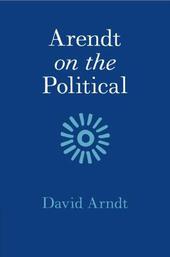
|
Arendt on the Political
Paperback / softback
Main Details
| Title |
Arendt on the Political
|
| Authors and Contributors |
By (author) David Arndt
|
| Physical Properties |
| Format:Paperback / softback | | Pages:292 | | Dimensions(mm): Height 230,Width 150 |
|
| Category/Genre | Western philosophy from c 1900 to now
Social and political philosophy |
|---|
| ISBN/Barcode |
9781108735704
|
| Classifications | Dewey:320.5 |
|---|
| Audience | | Professional & Vocational | |
|---|
| Illustrations |
Worked examples or Exercises
|
|
Publishing Details |
| Publisher |
Cambridge University Press
|
| Imprint |
Cambridge University Press
|
| Publication Date |
20 May 2021 |
| Publication Country |
United Kingdom
|
Description
What is politics? How is politics different from other spheres of human life? What is behind the debasement of political life today? This book argues that the most illuminating answers to these questions have come from Hannah Arendt. Arendt held that Western philosophy has never had a 'pure concept of the political', and that political philosophers have been guided and misguided by the assumptions implicit in their metaphysical questions. Her project was 'to look at politics ... with eyes unclouded by philosophy', and to retrieve the non-theoretical understanding of politics implicit in ancient Greek literature and history. David Arndt's original and accessible study shows how Arendt reworked some of the basic concepts of political philosophy, which in turn led her to a re-interpretation of American political history and even to a profoundly original reading of the US Declaration of Independence.
Author Biography
David Arndt is Tutor in the Integral Program at St Mary's College, California, where he teaches literature, philosophy, and Attic Greek.
Reviews'David Arndt's book is an excellent exposition of Arendt's political thought. Anyone interested in Arendt would benefit from the clear presentation and analysis of the main concepts and ideas Arendt thought through in her writings; the careful distinctions he offers between the meanings Arendt gave to these concepts and the more common understanding of them; and the useful theoretical and historical background by which Arndt contextualizes Arendt's contributions to political theory.' Shmuel Lederman, Notre Dame Philosophical Reviews
|